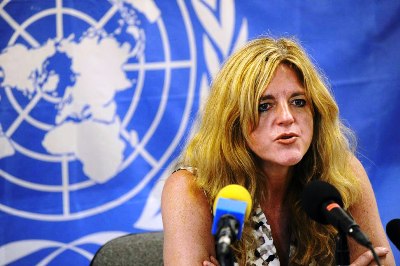S. Sudan contests neutrality of interim UN human rights report
February 22, 2014 (JUBA) – South Sudan on Saturday rejected the neutrality of an interim report on its human rights record, presented to the United Nations Security Council, saying the whole matter was “pure fabrication”.

Largely focused on human rights violations and abused allegedly carried out in South Sudan’s Unity, Central Equatoria, Jonglei and Upper Nile states, the 21-page cited numerous witnesses who reported the deliberate targeting of both national and foreign civilians in extrajudicial and other unlawful killings, including mass killings, enforced disappearances, gender based violence, ill treatments and torture by the forces allied to the two rivals engaged in the conflict.
The UN mission in the country, however, said a more comprehensive public report on human right violations and the ongoing crisis in South Sudan would be released in April.
“We have not seen the report, but it is possible that elements of neutrality may have been compromised, considering the kind of the United Nations officials we have in this country. Any difference from the previous reports which were written mostly on hearsays and rumours would be a big development, if not miracle,” a senior official told Sudan Tribune Saturday.
“The United Nations we have in this country is seen by the citizens as working against the government instead of working in collaboration”, added the official, closely linked to President Salva Kiir.
Daniel Awet Akot, a former deputy speaker of the country’s national assembly said the release of the interim report on South Sudan, which lacked clarity and only apportioned blames undermines efforts and processes aimed at a peaceful solutions to the crisis.
“Obviously some people will begin to point fingers and make unnecessary claims to undermine processes on which the government has embarked to find solution to this situation. Releasing such report is extremely dangerous, because it could jeopardize the process”, Akot exclusively told Sudan Tribune.
Some people will definitely feel that it was politically motivated and provocations to frustrate and demoralise key actors in the peace processes, he stressed.
Meanwhile, South Sudan’s justice minister said he was yet to go over the report so that he could offer any comments surrounding views questioning credibility and its neutrality, stressing that in law, evidences were essential in convincing the intended audiences or stakeholders.
“I need to go over the report first before I make any comment”, said Paulino Wanawila.
According to the report, also extended to Sudan Tribune, large number of civilians were “deliberately” targeted and killed along ethnic lines and many more were displaced for similar reasons. In the initial days of the conflict, it said, members of the country’s army loyal to President Kiir allegedly engaged in killing of Nuer residents living in Juba.
The report further cited similar activities and violations in Malakal, Bor and Bentiu were members of Dinka were allegedly killed by armed Nuer youth who had largely defected from the army and police institutions.
The world’s body, however, said it was investigating reports of mass grave in Juba, Bentiu and Rubkona in unity state, stressing that civilians bore the brunt of much of the fighting and the gross violations of human rights, which the two sides committed in the course of engagements.
Hilde Johnson, the head of the UN mission in the country said holding those responsible for what occurred during the conflict to account was crucial for peace.
“Accountability is crucial for the national reconciliation process to take root and succeed. Without bringing to justice the perpetrators of these horrendous crimes, revenge and impunity is likely to lead to a perpetual cycle of violence”, Johnson said in the statement.
But Santino Atem Deng, a member of the youth wing of the governing Sudan People’s Liberation Movement (SPLM) criticised the report, describing it as “rubbish and deceitful”.
“The so called UN report which heard today being discussed by the so called analysts on South Sudan on various radio FM and in the electronic media is rubbish. It was deceitfully put together by those who are working against the efforts of the democratically elected government under the leadership of General Salva Kiir Mayardit, president of the republic of South Sudan. That is all,” observed Deng.
“There nothing credible in the report. It is all about lies. Who does not know that there are people in the United Nations working against this country, especially the leadership of President Salva [Kiir]”, he stressed.
He largely blamed “puppet of western governments” and those working against the new nations as the architects of the interim report on human rights situation in the country.
“As the youth, we categorically reject it [the interim report] in its entirety”, said Deng, further western countries which he did not name for being “the worst human rights abuser who killed innocent people through aggression and intervention, and systematically committed illegal wire-tapping and surveillance not only over their own citizens but other countries”.
(ST)
